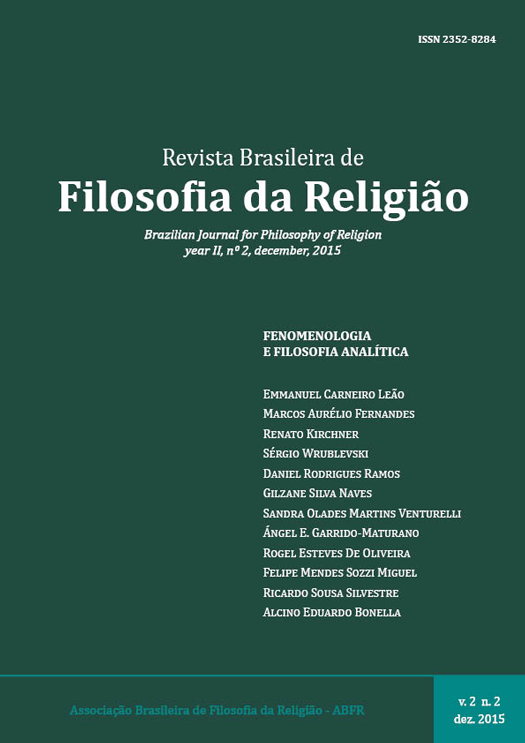The existence, the flight and the arrival of the gods in the Beiträge zur Philosophie of Heidegger
DOI:
https://doi.org/10.26512/2358-82842015e17377Keywords:
Existence. Time-space. Flight. Arrival of godsAbstract
The article presents the last two sections of Beiträge zur Philosophie (die Zu-künftigen- The Ones to Come, and Der letzte Gott - The Last God), however, in an attempt to discuss the movement of appropriation and transformation of human existence starting from the flight and the arrival of the gods. The annotations which follow aim at this meeting between man and God or the gods, from a well definite position, namely the foundation (grounding) of human existence as the astonishing site of the truth of being. Precisely, it has a view to the time-space structure in the last two sections of the work. It hasshown, that the annexation of reciprocity between the passage of the last God and essential swaying of the temporal-spatial structure of human existence is indispensable to state the issue of the divine in Beiträge. Finally, they indicate traces of temporality and spatiality in which human existence becomes the place where the event of the passage of the last God occurs.
Downloads
References
Courtine, Jean-François. Les traces et le passage du Dieu dans les Beiträge zur Philosophie. In
Archivio di Filosofia 62(1994), Pisa ”“ Roma, p. 519-38.
Derrida, Jacques. Dello Spirito. Heidegger e la questione. Milano: SE, 2010.
Esposito, Costantino.L’essere (di) Dio nei «Contributi alla Filosofia». In Heidegger. Storia e
fenomenologia del possibile. Bari: Levante editori, 2003.
Figal, Günter. Gottesvergessenheit. Über das Zentrum von Heideggers „Beiträgen zur Philosophie“.
In Zu Heidegger Antworten und Fragen. Frankfurt an Main: Vittorio Klostermann, 2009.
p. 145-62.
Heidegger, Martin. Hölderlin und das Wesen der Dichtung, In: Erläuterungen zu Hölderlin. GA
Frankfurt a.M.: Vittorio Klostermann, 1996; tr. it., Hölderlinng e l’essenza della poesia. In La
poesia di Hölderlin.Milano: Adelphi, 1981. p. 39-58.
______. Identität und Differenz, in Identität und Differenz, GA 11. Frankfurt a.M.: Vittorio Klostermann,
p. 27-79; tr. por., Identidade e Diferença. In Martin Heidegger. Conferências e
escritos filosóficos. São Paulo: Nova Cultural, 1999. p. 171-218. (Coleção Os pensadores)
______. Hölderlins Hymmen. »Germanien« und »Der Rhein«.GA 39. Frankfurt a.M.: Vittorio
Klostermann, 1999; tr. por., Hinos de Hölderlin. Lisboa: Piaget, 2004.
______ Einführung in die Metaphysik, GA 40. Tübingen: Max Niemeyer, 1998b; tr. por., Introdução
à metafísica. 4a edição. Rio de Janeiro: Tempo Brasileiro, 1999.
______ Grundfragen der Philosophie. Ausgewählte »Probleme« der »Logik«, GA 45. Frankfurt
a.M.: Vittorio Klostermann, 1992; tr. it., Domande Fondamentali della filosofia. Selezione di
«problemi» della «logica». Milano: Mursia, 1990.
______ Beiträge zur Philosophie (Vom Ereignis), GA 65. 3. .ed. Frankfurt a.M.: Vittorio Klostermann,
b; tr. esp., Aportes a la Filosofía. Acerca de evento. 2. ed. Buenos Aires: Editorial
Biblos, 2006.
______ Besinnung, GA 66.Frankfurt a.M.: Vittorio Klostermann, 1997; tr. por., Meditação. Petrópolis:
Vozes, 2010.
Nietzsche, Friedrich. Also Sprach Zarathustra, Ein Buch für Alle und Keinen. KSA 4. München:
de Gruyter, 1999. (Deutscher Taschenbuch); tr. por., Assim falava Zaratustra. Um livro para
todos e para ninguém. Petrópolis: Vozes, 2007.
Regina, Umberto. L‘«ultimo Dio» di Martin Heidegger. In Heidegger e la telogia. Brescia:
Morcelliana, 1995. p. 308-44.
Strummiello, GiuseppinaG. L’altro inizio del pensiero:I «Beiträge zur Philosophie»di Martin
Heidegger. Bari: Levante Editori, 1995.
Zarader, Marlène. A dívida impensada. Heidegger e a herança hebraica. Lisboa: Piaget, 1990.

